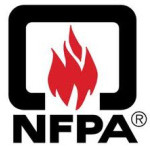- Industria: Fire safety
- Number of terms: 98780
- Number of blossaries: 0
- Company Profile:
Established in 1896, NFPA's mission is to reduce the worldwide burden of fire and other hazards on the quality of life by providing and advocating consensus codes and standards, research, training, and education.
The physical science of fire, which includes the components of fire, the stages of fire development, heat transfer, smoke travel, and flame spread.
Industry:Fire safety
The property of a material that passes the small-scale test in NFPA 701, Standard Methods of Fire Tests for Flame Propagation of Textiles and Films.
Industry:Fire safety
The quantity of heat required to raise the temperature of one pound of water 1°F at the pressure of 1 atmosphere and temperature of 60°F; a British thermal unit is equal to 1055 joules, 1. 055 kilojoules, and 252. 15 calories.
Industry:Fire safety
The process by which a person starts from a particular experience and proceeds to generalizations. The process by which hypotheses are developed based upon observable or known facts and the training, experience, knowledge, and expertise of the observer.
Industry:Fire safety
The pulling force that is achieved by the powered rescue tool while operating at the rated system input at the position of the arms or piston where the tool generates its least amount of force.
Industry:Fire safety
The replacement of the extinguishing agent (also includes the expellant for certain types of fire extinguishers).
Industry:Fire safety
The necessary equipment, usually a power outlet, consisting of a circuit breaker or switch and fuse and their accessories, located near the point of entrance of supply conductors to a recreational vehicle site and intended to constitute the disconnecting means for the supply to that site.
Industry:Fire safety
The rectangular area surrounding any runway within which most aircraft accidents can be expected to occur on airports. Its width extends 150 m (500 ft) from each side of the runway centerline, and its length is 1000 m (3300 ft) beyond each runway end.
Industry:Fire safety
